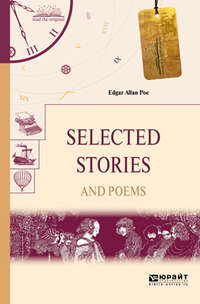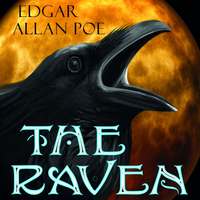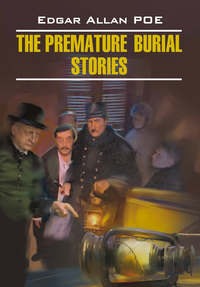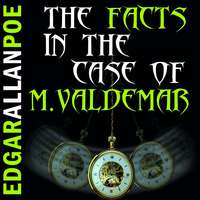 полная версия
полная версияThe Complete Stories of Edgar Allan Poe
From this, after some minutes, I was aroused by the voice of Pompey, who declared that he could stand it no longer, and requested that I would be so kind as to come down. This was unreasonable, and I told him so in a speech of some length. He replied but with an evident misunderstanding of my ideas upon the subject. I accordingly grew angry, and told him in plain words, that he was a fool, that he had committed an ignoramus e-clench-eye, that his notions were mere insommary Bovis, and his words little better than an ennemywerrybor’em. With this he appeared satisfied, and I resumed my contemplations.
It might have been half an hour after this altercation when, as I was deeply absorbed in the heavenly scenery beneath me, I was startled by something very cold which pressed with a gentle pressure on the back of my neck. It is needless to say that I felt inexpressibly alarmed. I knew that Pompey was beneath my feet, and that Diana was sitting, according to my explicit directions, upon her hind legs in the farthest corner of the room. What could it be? Alas! I but too soon discovered. Turning my head gently to one side, I perceived, to my extreme horror, that the huge, glittering, scimetar-like minute-hand of the clock, had, in the course of its hourly revolution, descended upon my neck. There was, I knew, not a second to be lost. I pulled back at once – but it was too late. There was no chance of forcing my head through the mouth of that terrible trap in which it was so fairly caught, and which grew narrower and narrower with a rapidity too horrible to be conceived. The agony of that moment is not to be imagined. I threw up my hands and endeavored, with all my strength, to force upward the ponderous iron bar. I might as well have tried to lift the cathedral itself. Down, down, down it came, closer and yet closer. I screamed to Pompey for aid; but he said that I had hurt his feelings by calling him “an ignorant old squint-eye:” I yelled to Diana; but she only said “bow-wow-wow,” and that “I had told her on no account to stir from the corner.” Thus I had no relief to expect from my associates.
Meantime the ponderous and terrific Scythe of Time (for I now discovered the literal import of that classical phrase) had not stopped, nor was it likely to stop, in its career. Down and still down, it came. It had already buried its sharp edge a full inch in my flesh, and my sensations grew indistinct and confused. At one time I fancied myself in Philadelphia with the stately Dr. Moneypenny, at another in the back parlor of Mr. Blackwood receiving his invaluable instructions. And then again the sweet recollection of better and earlier times came over me, and I thought of that happy period when the world was not all a desert, and Pompey not altogether cruel.
The ticking of the machinery amused me. Amused me, I say, for my sensations now bordered upon perfect happiness, and the most trifling circumstances afforded me pleasure. The eternal click-clack, click-clack, click-clack of the clock was the most melodious of music in my ears, and occasionally even put me in mind of the grateful sermonic harangues of Dr. Ollapod. Then there were the great figures upon the dial-plate – how intelligent, how intellectual, they all looked! And presently they took to dancing the Mazurka, and I think it was the figure V who performed the most to my satisfaction. She was evidently a lady of breeding. None of your swaggerers, and nothing at all indelicate in her motions. She did the pirouette to admiration – whirling round upon her apex. I made an endeavor to hand her a chair, for I saw that she appeared fatigued with her exertions – and it was not until then that I fully perceived my lamentable situation. Lamentable indeed! The bar had buried itself two inches in my neck. I was aroused to a sense of exquisite pain. I prayed for death, and, in the agony of the moment, could not help repeating those exquisite verses of the poet Miguel De Cervantes:
Vanny Buren, tan escondidaQuery no te senty vennyPork and pleasure, delly morryNommy, torny, darry, widdy!But now a new horror presented itself, and one indeed sufficient to startle the strongest nerves. My eyes, from the cruel pressure of the machine, were absolutely starting from their sockets. While I was thinking how I should possibly manage without them, one actually tumbled out of my head, and, rolling down the steep side of the steeple, lodged in the rain gutter which ran along the eaves of the main building. The loss of the eye was not so much as the insolent air of independence and contempt with which it regarded me after it was out. There it lay in the gutter just under my nose, and the airs it gave itself would have been ridiculous had they not been disgusting. Such a winking and blinking were never before seen. This behavior on the part of my eye in the gutter was not only irritating on account of its manifest insolence and shameful ingratitude, but was also exceedingly inconvenient on account of the sympathy which always exists between two eyes of the same head, however far apart. I was forced, in a manner, to wink and to blink, whether I would or not, in exact concert with the scoundrelly thing that lay just under my nose. I was presently relieved, however, by the dropping out of the other eye. In falling it took the same direction (possibly a concerted plot) as its fellow. Both rolled out of the gutter together, and in truth I was very glad to get rid of them.
The bar was now four inches and a half deep in my neck, and there was only a little bit of skin to cut through. My sensations were those of entire happiness, for I felt that in a few minutes, at farthest, I should be relieved from my disagreeable situation. And in this expectation I was not at all deceived. At twenty-five minutes past five in the afternoon precisely, the huge minute-hand had proceeded sufficiently far on its terrible revolution to sever the small remainder of my neck. I was not sorry to see the head which had occasioned me so much embarrassment at length make a final separation from my body. It first rolled down the side of the steeple, then lodged, for a few seconds, in the gutter, and then made its way, with a plunge, into the middle of the street.
I will candidly confess that my feelings were now of the most singular – nay, of the most mysterious, the most perplexing and incomprehensible character. My senses were here and there at one and the same moment. With my head I imagined, at one time, that I the head, was the real Signora Psyche Zenobia – at another I felt convinced that myself, the body, was the proper identity. To clear my ideas on this topic I felt in my pocket for my snuff-box, but, upon getting it, and endeavoring to apply a pinch of its grateful contents in the ordinary manner, I became immediately aware of my peculiar deficiency, and threw the box at once down to my head. It took a pinch with great satisfaction, and smiled me an acknowledgement in return. Shortly afterwards it made me a speech, which I could hear but indistinctly without ears. I gathered enough, however, to know that it was astonished at my wishing to remain alive under such circumstances. In the concluding sentences it quoted the noble words of Ariosto —
Il pover hommy che non sera cortyAnd have a combat tenty erry morty;thus comparing me to the hero who, in the heat of the combat, not perceiving that he was dead, continued to contest the battle with inextinguishable valor. There was nothing now to prevent my getting down from my elevation, and I did so. What it was that Pompey saw so very peculiar in my appearance I have never yet been able to find out. The fellow opened his mouth from ear to ear, and shut his two eyes as if he were endeavoring to crack nuts between the lids. Finally, throwing off his overcoat, he made one spring for the staircase and disappeared. I hurled after the scoundrel these vehement words of Demosthenes —
Andrew O’Phlegethon, you really make haste to fly,
and then turned to the darling of my heart, to the one-eyed! the shaggy-haired Diana. Alas! what a horrible vision affronted my eyes? Was that a rat I saw skulking into his hole? Are these the picked bones of the little angel who has been cruelly devoured by the monster? Ye gods! and what do I behold – is that the departed spirit, the shade, the ghost, of my beloved puppy, which I perceive sitting with a grace so melancholy, in the corner? Harken! for she speaks, and, heavens! it is in the German of Schiller —
“Unt stubby duk, so stubby dunDuk she! duk she!”Alas! and are not her words too true?And if I died at least I diedFor thee – for thee.Sweet creature! she too has sacrificed herself in my behalf. Dogless, niggerless, headless, what now remains for the unhappy Signora Psyche Zenobia? Alas – nothing! I have done.
THE END
Ligeia (1838)
And the will therein lielh, which dieth not. Who knoweth the mysteries of the will, with its vigor? For God is but a great will pervading all things by nature of its intentness. Man doth not yield himself to the angels, nor unto death utterly, save only through the weakness of his feeble will.
Joseph GlanvillI cannot, for my soul, remember how, when, or even precisely where, I first became acquainted with the lady Ligeia. Long years have since elapsed, and my memory is feeble through much suffering. Or, perhaps, I cannot now bring these points to mind, because, in truth, the character of my beloved, her rare learning, her singular yet placid cast of beauty, and the thrilling and enthralling eloquence of her low musical language, made their way into my heart by paces so steadily and stealthily progressive that they have been unnoticed and unknown. Yet I believe that I met her first and most frequently in some large, old, decaying city near the Rhine. Of her family – I have surely heard her speak. That it is of a remotely ancient date cannot be doubted. Ligeia! Ligeia! Buried in studies of a nature more than all else adapted to deaden impressions of the outward world, it is by that sweet word alone – by Ligeia – that I bring before mine eyes in fancy the image of her who is no more. And now, while I write, a recollection flashes upon me that I have never known the paternal name of her who was my friend and my betrothed, and who became the partner of my studies, and finally the wife of my bosom. Was it a playful charge on the part of my Ligeia? or was it a test of my strength of affection, that I should institute no inquiries upon this point? or was it rather a caprice of my own – a wildly romantic offering on the shrine of the most passionate devotion? I but indistinctly recall the fact itself – what wonder that I have utterly forgotten the circumstances which originated or attended it? And, indeed, if ever that spirit which is entitled Romance – if ever she, the wan and the misty-winged Ashtophet of idolatrous Egypt, presided, as they tell, over marriages ill-omened, then most surely she presided over mine.
There is one dear topic, however, on which my memory fails me not. It is the person of Ligeia. In stature she was tall, somewhat slender, and, in her latter days, even emaciated. I would in vain attempt to portray the majesty, the quiet ease, of her demeanor, or the incomprehensible lightness and elasticity of her footfall. She came and departed as a shadow. I was never made aware of her entrance into my closed study save by the dear music of her low sweet voice, as she placed her marble hand upon my shoulder. In beauty of face no maiden ever equalled her. It was the radiance of an opium dream – an airy and spirit-lifting vision more wildly divine than the phantasies which hovered about the slumbering souls of the daughters of Delos. Yet her features were not of that regular mould which we have been falsely taught to worship in the classical labors of the heathen. “There is no exquisite beauty,” says Bacon, Lord Verulam, speaking truly of all the forms and genera of beauty, “without some strangeness in the proportion.” Yet, although I saw that the features of Ligeia were not of a classic regularity – although I perceived that her loveliness was indeed “exquisite,” and felt that there was much of “strangeness” pervading it, yet I have tried in vain to detect the irregularity and to trace home my own perception of “the strange.” I examined the contour of the lofty and pale forehead – it was faultless – how cold indeed that word when applied to a majesty so divine! – the skin rivalling the purest ivory, the commanding extent and repose, the gentle prominence of the regions above the temples; and then the raven-black, the glossy, the luxuriant and naturally-curling tresses, setting forth the full force of the Homeric epithet, “hyacinthine!” I looked at the delicate outlines of the nose – and nowhere but in the graceful medallions of the Hebrews had I beheld a similar perfection. There were the same luxurious smoothness of surface, the same scarcely perceptible tendency to the aquiline, the same harmoniously curved nostrils speaking the free spirit. I regarded the sweet mouth. Here was indeed the triumph of all things heavenly – the magnificent turn of the short upper lip – the soft, voluptuous slumber of the under – the dimples which sported, and the color which spoke – the teeth glancing back, with a brilliancy almost startling, every ray of the holy light which fell upon them in her serene and placid, yet most exultingly radiant of all smiles. I scrutinized the formation of the chin – and here, too, I found the gentleness of breadth, the softness and the majesty, the fullness and the spirituality, of the Greek – the contour which the God Apollo revealed but in a dream, to Cleomenes, the son of the Athenian. And then I peered into the large eyes of Ligeia.
For eyes we have no models in the remotely antique. It might have been, too, that in these eyes of my beloved lay the secret to which Lord Verulam alludes. They were, I must believe, far larger than the ordinary eyes of our own race. They were even fuller than the fullest of the gazelle eyes of the tribe of the valley of Nourjahad. Yet it was only at intervals – in moments of intense excitement – that this peculiarity became more than slightly noticeable in Ligeia. And at such moments was her beauty – in my heated fancy thus it appeared perhaps – the beauty of beings either above or apart from the earth – the beauty of the fabulous Houri of the Turk. The hue of the orbs was the most brilliant of black, and, far over them, hung jetty lashes of great length. The brows, slightly irregular in outline, had the same tint. The “strangeness,” however, which I found in the eyes, was of a nature distinct from the formation, or the color, or the brilliancy of the features, and must, after all, be referred to the expression. Ah, word of no meaning! behind whose vast latitude of mere sound we intrench our ignorance of so much of the spiritual. The expression of the eyes of Ligeia! How for long hours have I pondered upon it! How have I, through the whole of a midsummer night, struggled to fathom it! What was it – that something more profound than the well of Democritus – which lay far within the pupils of my beloved? What was it? I was possessed with a passion to discover. Those eyes! those large, those shining, those divine orbs! they became to me twin stars of Leda, and I to them devoutest of astrologers.
There is no point, among the many incomprehensible anomalies of the science of mind, more thrillingly exciting than the fact – never, I believe, noticed in the schools – that, in our endeavors to recall to memory something long forgotten, we often find ourselves upon the very verge of remembrance, without being able, in the end, to remember. And thus how frequently, in my intense scrutiny of Ligeia’s eyes, have I felt approaching the full knowledge of their expression – felt it approaching – yet not quite be mine – and so at length entirely depart! And (strange, oh strangest mystery of all!) I found, in the commonest objects of the universe, a circle of analogies to that expression. I mean to say that, subsequently to the period when Ligeia’s beauty passed into my spirit, there dwelling as in a shrine, I derived, from many existences in the material world, a sentiment such as I felt always aroused within me by her large and luminous orbs. Yet not the more could I define that sentiment, or analyze, or even steadily view it. I recognized it, let me repeat, sometimes in the survey of a rapidly-growing vine – in the contemplation of a moth, a butterfly, a chrysalis, a stream of running water. I have felt it in the ocean; in the falling of a meteor. I have felt it in the glances of unusually aged people. And there are one or two stars in heaven – (one especially, a star of the sixth magnitude, double and changeable, to be found near the large star in Lyra) in a telescopic scrutiny of which I have been made aware of the feeling. I have been filled with it by certain sounds from stringed instruments, and not unfrequently by passages from books. Among innumerable other instances, I well remember something in a volume of Joseph Glanvill, which (perhaps merely from its quaintness – who shall say?) never failed to inspire me with the sentiment; – “And the will therein lieth, which dieth not. Who knoweth the mysteries of the will, with its vigor? For God is but a great will pervading all things by nature of its intentness. Man doth not yield him to the angels, nor unto death utterly, save only through the weakness of his feeble will.”
Length of years, and subsequent reflection, have enabled me to trace, indeed, some remote connection between this passage in the English moralist and a portion of the character of Ligeia. An intensity in thought, action, or speech, was possibly, in her, a result, or at least an index, of that gigantic volition which, during our long intercourse, failed to give other and more immediate evidence of its existence. Of all the women whom I have ever known, she, the outwardly calm, the ever-placid Ligeia, was the most violently a prey to the tumultuous vultures of stern passion. And of such passion I could form no estimate, save by the miraculous expansion of those eyes which at once so delighted and appalled me – by the almost magical melody, modulation, distinctness and placidity of her very low voice – and by the fierce energy (rendered doubly effective by contrast with her manner of utterance) of the wild words which she habitually uttered.
I have spoken of the learning of Ligeia: it was immense – such as I have never known in woman. In the classical tongues was she deeply proficient, and as far as my own acquaintance extended in regard to the modern dialects of Europe, I have never known her at fault. Indeed upon any theme of the most admired, because simply the most abstruse of the boasted erudition of the academy, have I ever found Ligeia at fault? How singularly – how thrillingly, this one point in the nature of my wife has forced itself, at this late period only, upon my attention! I said her knowledge was such as I have never known in woman – but where breathes the man who has traversed, and successfully, all the wide areas of moral, physical, and mathematical science? I saw not then what I now clearly perceive, that the acquisitions of Ligeia were gigantic, were astounding; yet I was sufficiently aware of her infinite supremacy to resign myself, with a child-like confidence, to her guidance through the chaotic world of metaphysical investigation at which I was most busily occupied during the earlier years of our marriage. With how vast a triumph – with how vivid a delight – with how much of all that is ethereal in hope – did I feel, as she bent over me in studies but little sought – but less known – that delicious vista by slow degrees expanding before me, down whose long, gorgeous, and all untrodden path, I might at length pass onward to the goal of a wisdom too divinely precious not to be forbidden!
How poignant, then, must have been the grief with which, after some years, I beheld my well-grounded expectations take wings to themselves and fly away! Without Ligeia I was but as a child groping benighted. Her presence, her readings alone, rendered vividly luminous the many mysteries of the transcendentalism in which we were immersed. Wanting the radiant lustre of her eyes, letters, lambent and golden, grew duller than Saturnian lead. And now those eyes shone less and less frequently upon the pages over which I pored. Ligeia grew ill. The wild eyes blazed with a too – too glorious effulgence; the pale fingers became of the transparent waxen hue of the grave, and the blue veins upon the lofty forehead swelled and sank impetuously with the tides of the most gentle emotion. I saw that she must die – and I struggled desperately in spirit with the grim Azrael. And the struggles of the passionate wife were, to my astonishment, even more energetic than my own. There had been much in her stern nature to impress me with the belief that, to her, death would have come without its terrors; – but not so. Words are impotent to convey any just idea of the fierceness of resistance with which she wrestled with the Shadow. I groaned in anguish at the pitiable spectacle. I would have soothed – I would have reasoned; but, in the intensity of her wild desire for life, – for life – but for life – solace and reason were alike the uttermost of folly. Yet not until the last instance, amid the most convulsive writhings of her fierce spirit, was shaken the external placidity of her demeanor. Her voice grew more gentle – grew more low – yet I would not wish to dwell upon the wild meaning of the quietly uttered words. My brain reeled as I hearkened entranced, to a melody more than mortal – to assumptions and aspirations which mortality had never before known.
That she loved me I should not have doubted; and I might have been easily aware that, in a bosom such as hers, love would have reigned no ordinary passion. But in death only, was I fully impressed with the strength of her affection. For long hours, detaining my hand, would she pour out before me the overflowing of a heart whose more than passionate devotion amounted to idolatry. How had I deserved to be so blessed by such confessions? – how had I deserved to be so cursed with the removal of my beloved in the hour of her making them? But upon this subject I cannot bear to dilate. Let me say only, that in Ligeia’s more than womanly abandonment to a love, alas! all unmerited, all unworthily bestowed, I at length recognized the principle of her longing with so wildly earnest a desire for the life which was now fleeing so rapidly away. It is this wild longing – it is this eager vehemence of desire for life – but for life – that I have no power to portray – no utterance capable of expressing.
At high noon of the night in which she departed, beckoning me, peremptorily, to her side, she bade me repeat certain verses composed by herself not many days before. I obeyed her. – They were these:
Lo! ‘tis a gala nightWithin the lonesome latter years!An angel throng, bewinged, bedightIn veils, and drowned in tears,Sit in a theatre, to seeA play of hopes and fears,While the orchestra breathes fitfullyThe music of the spheres.Mimes, in the form of God on high,Mutter and mumble low,And hither and thither fly —Mere puppets they, who come and goAt bidding of vast formless thingsThat shift the scenery to and fro,Flapping from out their Condor wingsInvisible Wo!That motley drama! – oh, be sureIt shall not be forgot!With its Phantom chased forevermore,By a crowd that seize it not,Through a circle that ever returneth inTo the self-same spot,And much of Madness and more of Sin,And Horror the soul of the plot.But see, amid the mimic rout,A crawling shape intrude!A blood-red thing that writhes from outThe scenic solitude!It writhes! – it writhes! – with mortal pangsThe mimes become its food,And the seraphs sob at vermin fangsIn human gore imbued.Out – out are the lights – out all!And over each quivering form,The curtain, a funeral pall,Comes down with the rush of a storm,And the angels, all pallid and wan,Uprising, unveiling, affirmThat the play is the tragedy, “Man,”And its hero the Conqueror Worm.“O God!” half shrieked Ligeia, leaping to her feet and extending her arms aloft with a spasmodic movement, as I made an end of these lines – “O God! O Divine Father! – shall these things be undeviatingly so? – shall this Conqueror be not once conquered? Are we not part and parcel in Thee? Who – who knoweth the mysteries of the will with its vigor? Man doth not yield him to the angels, nor unto death utterly, save only through the weakness of his feeble will.”









